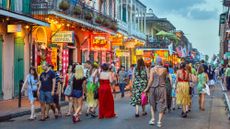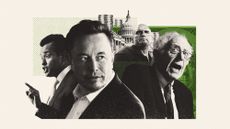Would you still love America if America didn't love you back?
What if the social contract were a marriage compact?


You probably love your country. But why?
That's a question that can upset a young relationship, or even a marriage: Why do you love me?
We don't ask it much about love of country, but maybe we should. Not because it is a perfect analogy — the social contract that's supposed to bind America together is clearly different than a marriage compact. But if you think about patriotism in terms of romantic love, you can explore this idea: What if you loved America and it didn't love you back? What if you didn't even feel it was trying?
Subscribe to The Week
Escape your echo chamber. Get the facts behind the news, plus analysis from multiple perspectives.

Sign up for The Week's Free Newsletters
From our morning news briefing to a weekly Good News Newsletter, get the best of The Week delivered directly to your inbox.
From our morning news briefing to a weekly Good News Newsletter, get the best of The Week delivered directly to your inbox.
Here's why it might be a useful exercise: It is difficult, maybe impossible, for people who (like me) aren't Black to understand daily life as a Black person in America. I did not know until college, for example, that security personnel frequently follow Black shoppers around in stores, a daily humiliation, intimidation, and perpetual rejection. But most of us have experience with love and heartbreak.
Los Angeles Clippers coach Doc Rivers hit on this last week, after police in Kenosha, Wisconsin, shot an unarmed Black man, Jacob Blake, in the back seven times, in front of his three children. Rivers asked why the speakers over at the Republican National Convention were "talking about fear" when Black Americans are the ones being shot and killed by police officers sworn to serve and protect the citizenry, when only Black parents are forced to warn their children that this might happen to them, even if they do nothing wrong.
"We're the ones getting killed, we're the ones getting shot," Rivers said. "All you do is keep hearing about fear. It's amazing to me why we keep loving this country and this country does not love us back."
The U.S. Constitution, America's social contract, promises in its list of rights that citizens won't "be deprived of life, liberty, or property, without due process of law." The Declaration of Independence declares "life, liberty, and the pursuit of happiness" to be "self-evident" and "unalienable rights."
What would you do if the U.S. consistently failed to hold up its end of that bargain, even at the most basic level? "All we're asking is you live up to the Constitution," Rivers told America. "That's all we're asking, for everybody. For everyone." America is "lucky what Black people are looking for is equality and not revenge," author Kimberly Jones said in June.
Black America has given the U.S., collaboratively or whole cloth, the blues, jazz, soul, rock 'n' roll, and hip-hop and rap; some of the country's greatest athletes, artists, and writers; scientific advances and manual labor; great jurists and political and military leaders; a brown face America has, at important moments, proudly showed the world. What has America given Black America in return?
Rivers isn't alone in painting race in America as a story of dysfunctional relationship. New York Times culture critic Wesley Morris wrote about a similar revelation in early June, after watching police asphyxiate George Floyd and listening to Patti LaBelle's live recording of the Kenny Gamble and Leon Huff song "If You Don't Know Me By Now."
"We've been trying to make this country great, but you won't let us," Morris wrote.
Black Americans have come in peace, they've come armed. They've just been trying to mind their business. Disappointment awaits, regardless. Anytime the racial temperature goes up and hell pays a visit to earth, the disappointment takes a holiday. And you fight. You fight because you're tired. Yet you're tired because you've been fighting. For so long. In waves, in loops, in vacuums, in vain. I suppose this is all how I found myself doubled over the kitchen sink on Sunday, bawling into a bowl of greens, a knife in one hand, the other gathered into the loneliest fist that hand had ever made. I was doubled over because Patti LaBelle had wrecked me. [Wesley Morris, The New York Times]
"If You Don't Know Me By Now," written for LaBelle but first recorded by Harold Melvin & the Blue Tones (then made a hit again by Simply Red), is "not a protest anthem," Morris notes. "It's a lovers-at-a-crossroads jam," but LaBelle is "preaching about something that, at my sink, at a crossroads, along with millions of other black people, sounded like a much bigger love," a declaration of her worth and "an ultimatum now being laid down in the streets of this country."
"If you don't know me by now, you will never, never, never know me," the song laments. "What good is a love affair if you can't see eye to eye?"
When a relationship is good, not seeing eye to eye isn't a deal-breaker. But I think we can agree that it's not a good relationship when one partner lives with a perpetually broken heart.
Divorce is not an option here — everyone has too much equity in the home to walk away, and where would they even go? — but luckily, we needn't take the analogy that far. No marriage could survive the strain of 250 years of enslavement, lynching, disenfranchisement, and other abuses. And this is not, after all, a romantic partnership.
America is a million daily interactions between individuals, millions of individual acts of kindness, cruelty, or indifference. We don't have to be ugly. But we do have to live together.
Or maybe we get to live together. In America. But don't pretend America treats us all equally. And never forget it doesn't have to be that way.
Sign up for Today's Best Articles in your inbox
A free daily email with the biggest news stories of the day – and the best features from TheWeek.com
Peter has worked as a news and culture writer and editor at The Week since the site's launch in 2008. He covers politics, world affairs, religion and cultural currents. His journalism career began as a copy editor at a financial newswire and has included editorial positions at The New York Times Magazine, Facts on File, and Oregon State University.
-
 'The scene runs as intended the vast majority of the time'
'The scene runs as intended the vast majority of the time'Instant Opinion Opinion, comment and editorials of the day
By Justin Klawans, The Week US Published
-
 Why are (some) Democrats backing DOGE?
Why are (some) Democrats backing DOGE?Today's Big Question Elon Musk's cost-cutting task force gets bipartisan flavor
By Joel Mathis, The Week US Published
-
 Walking pneumonia cases are picking up pace
Walking pneumonia cases are picking up paceThe explainer Another respiratory illness to be wary of
By Devika Rao, The Week US Published
-
 US election: who the billionaires are backing
US election: who the billionaires are backingThe Explainer More have endorsed Kamala Harris than Donald Trump, but among the 'ultra-rich' the split is more even
By Harriet Marsden, The Week UK Published
-
 US election: where things stand with one week to go
US election: where things stand with one week to goThe Explainer Harris' lead in the polls has been narrowing in Trump's favour, but her campaign remains 'cautiously optimistic'
By Harriet Marsden, The Week UK Published
-
 Is Trump okay?
Is Trump okay?Today's Big Question Former president's mental fitness and alleged cognitive decline firmly back in the spotlight after 'bizarre' town hall event
By Harriet Marsden, The Week UK Published
-
 The life and times of Kamala Harris
The life and times of Kamala HarrisThe Explainer The vice-president is narrowly leading the race to become the next US president. How did she get to where she is now?
By The Week UK Published
-
 Will 'weirdly civil' VP debate move dial in US election?
Will 'weirdly civil' VP debate move dial in US election?Today's Big Question 'Diametrically opposed' candidates showed 'a lot of commonality' on some issues, but offered competing visions for America's future and democracy
By Harriet Marsden, The Week UK Published
-
 1 of 6 'Trump Train' drivers liable in Biden bus blockade
1 of 6 'Trump Train' drivers liable in Biden bus blockadeSpeed Read Only one of the accused was found liable in the case concerning the deliberate slowing of a 2020 Biden campaign bus
By Peter Weber, The Week US Published
-
 How could J.D. Vance impact the special relationship?
How could J.D. Vance impact the special relationship?Today's Big Question Trump's hawkish pick for VP said UK is the first 'truly Islamist country' with a nuclear weapon
By Harriet Marsden, The Week UK Published
-
 Biden, Trump urge calm after assassination attempt
Biden, Trump urge calm after assassination attemptSpeed Reads A 20-year-old gunman grazed Trump's ear and fatally shot a rally attendee on Saturday
By Peter Weber, The Week US Published